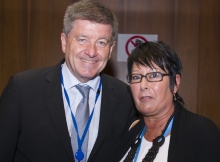A tripartite step towards improving employment and working conditions in the health services

The Tripartite Meeting on Improving Employment and Working Conditions in the Health Services was the first sectorial meeting of such profile on health services, since 1998. The purpose of the meeting was to “discuss decent work strategies that effectively address health workforce shortages, as a prerequisite to enable provision of equal access to health care for all in need, with a view to adopting conclusions on future programme development and to inform policy-making on the selected topic at the international, regional and national levels.”
The meeting included representatives of over forty governments and eight members representing the Employers’ group. The 21-member Workers’ group, with eight official delegates comprising representatives from six PSI affiliates and 2 UNI Global Union affiliates was led by Rosa Pavanelli, the PSI General Secretary.
In her opening speech, Rosa Pavanelli noted that:
Privatisation, commercialisation and cuts in the funding of public health; liberalisation of health services delivery, driven by free trade agreements; increased corruption; increasing labour market flexibilisation and deregulation, including outsourcing of non-clinical and clinical services; climate change, violent conflicts and humanitarian disasters and demographic transitions are all challenges for the health sector.
To address these issues and achieve “the aim of equal access to health for all and ensuring that we have the required trained workforce needed to deliver this,” she stressed the necessity for: International Labour Standards to be respected by governments and employers; discouraging non-standard forms of employment and precarity; safe and effective staffing for health; fair and ethical health workers’ migration; combating workplace violence, including in humanitarian settings; standardization of guidelines, including for Community Health Workers; rolling back the commercialisation of health by multinational corporations, and; due respect for trade union rights.
The Governments’ group spokesperson Mme Habiba Kherrour, Premier Secrétaire of the Algerian Permanent Mission to Geneva pointed out that the meeting was quite important against the background of the Sustainable Development Goals. While expressing the view that governments’ funding of public health has been constrained by the global economic downturn, virtually every government present agreed that expenditure on health, including health employment is an investment and not cost.
This reflects the conclusions reached by the United Nations High-Level Commission on Health Employment and Economic Growth (CommHEEG), which the PSI General Secretary, Rosa Pavanelli represented the labour movement and public services on, as a commissioner. A side event was organised presided over by Guy Ryder, the ILO Director General, where Jim Campbell from the World Health Organisation led an incisive discussion on the work and recommendations of the ComHEEG.
Based on the consensus that investing in the health workforce is of paramount importance, it was pointed out that austerity measures will not help matters. Speaking for the Workers’ group, Rosa Pavanelli called for tax justice, saying: “We do believe that a major cause of injustice around the world is the broken taxation system, including tax evasion, tax dodging and tax loopholes.”
The Workers’ group was also successful in preventing tripartite support for Public-Private Partnerships (PPPs). There is a rich evidence base for concluding that PPPs simply amount to the subsidising of private interests with public funds. While private investments cannot be discountenanced, these have to be adequately regulated and should not be passed off as being in partnership with public health, which is the mainstay of universal access to health care.
Occupational Safety and Health (OSH) was likewise stressed as being essential for sustainable delivery of quality health services. The fatal dilemma faced by health workers without personal protective equipment in Liberia at the onset of the Ebola outbreak was pointed out as a macabre example of the dangers posed when there are flawed OSH regimes in place. This is not tolerable. As Pavanelli pointed out “it is not fair to call workers that die because of lack of OSH measures being in place, heroes. They deserve their dignity while alive, and to be kept alive”.
Towards ensuring decent work in the health services, as governments rise up to meet the envisaged shortfall of 18 million health workers globally by 2030 if action is not taken now, the following recommendations were made, in the conclusions of the meeting:
- the ILO will promote the ratification and effective implementation of international labour standards relevant to the sector, as well as respect for the fundamental principles and rights at work (FPRW);
- Governments, employers and the trade unions will engage in effective social dialogue to ensure the aim of improving employment and working conditions in the health services is met;
- Social partners will define, invest in and implement health workforce strategies in line with recommendations of the CommHEEG, and encourage the ILO Governing Body to consider the Five-Year Action Plan for Health Employment and Economic Growth;
- ILO should undertake a comprehensive study on member States’ national laws and practices, and assess if existing ILO programmes, activities and instruments and those from the WHO provide a sufficient framework for social partners’ promotion of decent work. Additional guidance to be considered, if necessary, with particular attention to home care and community-based meetings. The study’s report could be the basis for discussion for an ILO Tripartite Experts Meeting;
- ILO, in collaboration with other specialised international and regional agencies, will develop a health workforce research agenda, undertaking comparative analyses to strengthen the evidence, accountability and action to promote decent work and productive employment in the health sector, including the development of international recognition and acceptance of health workers’ qualifications and certification, and;
- ILO would provide policy advice and technical assistance in the development of national health workforce policies with a focus on employment creation and decent work;
- Over the next five years, subsequent to the ILO Governing Body’s action on the recommendations of the Tripartite Meeting, regional tripartite sectorial meetings would be held to promote the robust conclusions of this successful meeting.

